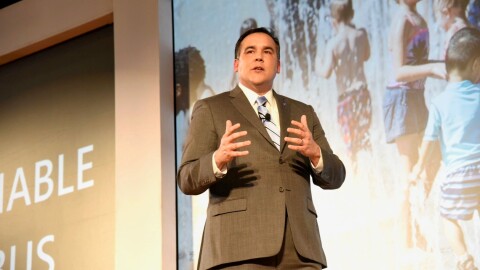Citing media scrutiny, the city of Columbus has returned $66,000 in private sponsorship money it had accepted for Mayor Andrew Ginther's "State Of The City" address earlier this month.
Ginther's February 13 event at West High School featured 15 corporate sponsors, who contributed anywhere from $1,000-25,000. WOSU found that Columbus was the only major city in Ohio that accepted private sponsorships to fund its State Of The City.
"The city has collected funds for the State of the City address since 2004. Questions raised by media coverage and internal discussions led us to acknowledge and accept that times have changed and perceptions matter," said city spokeswoman Robin Davis. "We decided to discontinue the process and return funds for this year’s address."
City taxpayer money will now be used to pay for the State Of The City, putting Columbus in line with other Ohio governments.
Following the address, the Mayor's Office sent letters to event sponsors with their returned checks enclosed.
"While the city is fortunate to have private, public, and not-for-profit leaders willing to support this event, we have determined it best that the City cover the costs associated 2020 State of the City Address [sic]," reads the letter from deputy chief of staff Kimber Perfect.
Columbus began privately sponsoring the annual address in 2004 under Mayor Michael Coleman. Speaking to WOSU, Ginther defended the practice in early February.
“You know, former Mayor Coleman and I believe it’s important to get the event out of city hall and to take it to neighborhoods throughout the city, and we don’t think necessarily that city resources should go towards it,” Ginther told WOSU.
The largest sponsor, Canadian engineering firm Stantec, has contributed $25,000 for the event the last two years. United Healthcare contributed $10,000, while Spectrum, Columbus Association of Realtors, Charter Communications and Arcadis contributed $5,000 each.
Other sponsors this year included Black & Veatch ($2,500), Burgess & Niple ($2,500), Elford ($2,500), NBBJ ($2,500), Osborn Engineering ($2,500), Schooley Caldwell ($2,500) and Design Group ($1,000).
“You know we ask a lot of different people to support it. Some say yes, some say no,” Ginther told WOSU. “We think it’s the best way to include more people and not necessarily have taxpayers pay for it.”
Columbus’ event is also significantly more expensive than comparable cities – last year, Columbus spent $20,000 on production costs and $15,000 for an invite-only reception at the Franklin Park Conservatory.
Government watchdogs have criticized the practice of accepting private sponsorships. Advocates from Common Cause Ohio say the reception – while legal under state law – looks like a campaign function and should be paid for with campaign dollars.
“So it in no way shape or form is political or campaign-related,” Ginther said. “It is neighborhood and community-based and it revolves around the State Of The City, and since there are no city resources that are dedicated to the State Of The City, we think it is appropriate.”
Excess money raised from State Of The City sponsorships go into a special events funds, which pays for other city gatherings like the Women’s Commission and the 9/11 remembrance.
Ginther’s address this year was interrupted by activists protesting police brutality. The Mayor’s Office says it was working to arrange a meeting between Ginther and the protesters.




